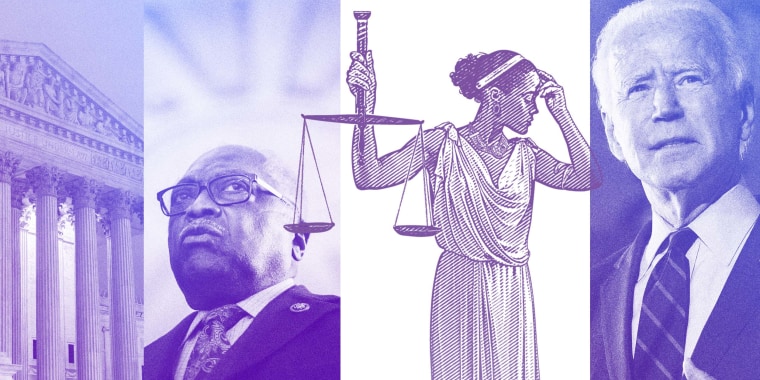Black lawmakers, activists and Washington insiders will likely play a major role in guiding President Joe Biden as he works to fulfill his promise to nominate a Black woman to fill the Supreme Court seat being vacated by Justice Stephen Breyer later this year.
That is, if you believe — as I do — the president can be swayed on this by outside opinion.
Rep. Jim Clyburn, viewed by many as Biden’s kingmaker for giving him a crucial endorsement during the Democratic presidential primary in 2020, seems to think so, as well. The South Carolina Democrat has engaged in a public campaign for his chosen pick, J. Michelle Childs, a U.S. district judge in his state.
Clyburn has even looped in Sens. Lindsey Graham and Tim Scott — two South Carolina Republicans — on his promo push, intent on showing Childs has bipartisan appeal.
But given the rarity of the moment — the first nomination of a Black woman to the Supreme Court — that push must be conducted carefully, so as to not tamp down reasonable debate and consideration over other qualified candidates. In jockeying for position, Clyburn could run the risk of imposing his will too forcefully and spurning other Black women.

For his part, Clyburn recently told The Washington Post his push shouldn’t be viewed as an ultimatum.
“I don’t believe in ultimatums," he said. "I don’t want nobody giving me one, and I’m not going to give anybody else one. I may be disappointed for the rest of my life, but I’m not going to give an ultimatum.”
Admittedly, I chuckled at that. If the virtual assurance you’ll be disappointed for the rest of your life if a friend doesn’t agree with your preferred choice isn’t an ultimatum, I don’t know what is. Nonetheless, his remarks are a sign that Biden’s Supreme Court pledge has given way to a fascinatingly vigorous, and complex, current of Supreme Court advocacy in Black circles.
Black women lawmakers have shown a clear understanding of this complexity and, having likely been forced to compete with other Black women for scarce positions in white-dominated spaces (similar to the Supreme Court), they’ve warned others not to pit Biden’s potential nominees against one another.
There’s a thin line, they acknowledge, between lifting up your choice and downplaying others.
And to be clear: these lawmakers’ recommendations haven’t stopped even the most cutthroat attempts by some people looking to tout or tank specific nominees under consideration. Just last week, NBC News obtained a letter from the first Black federal judge in Alabama, who reportedly urged Biden not to select Ketanji Brown Jackson, a federal appellate judge, to fill the vacancy. I leave it to you to guess how and why the letter is surfacing now.
But the fundamental point is that these kinds of outward shows of dissatisfaction toward any one candidate, or vehement preference for another, may not have their desired effect.
Black women know the experience of being second-guessed and passed over. In their exuberance, people jockeying for their preferred Supreme Court nominee need to make sure they’re not re-creating that experience.
